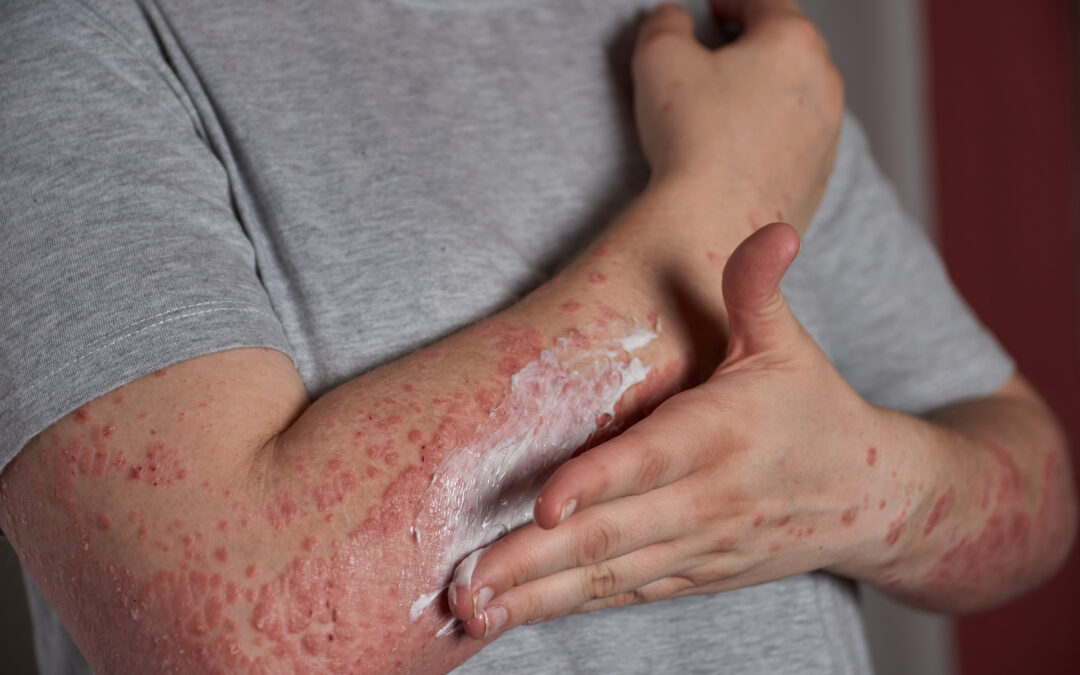Are you one of the 7.5 million people who struggle with psoriasis? And if so, have you been left disappointed by the results of your prescription medications or creams? Acupuncture for psoriasis may help.
Unfortunately, psoriasis is a complex and frustrating condition for many people. To make matters worse, modern medicine’s treatments for psoriasis aren’t always effective and can leave you with unwanted side effects. The good news is that there is another way: Acupuncture and herbal medicine for psoriasis.
Acupuncture and herbal medicine are safe and effective therapies that not only help relieve psoriasis symptoms like itching and bleeding, but also work to heal the body’s root immune imbalances that cause psoriasis. The result? Less irritation, disappearing plaques, and a healthier body.
Read on to learn how Oriental medicine can help you heal your psoriasis.
What is Psoriasis?
Psoriasis is an inflammatory skin condition that occurs when the body rapidly produces skin cells without shedding the old ones. Healthy skin cell turnover usually occurs over the course of a month. But in people with psoriasis, new skin cells grow and rise to the surface every few days. The cells at the surface have not completed their month-long cycle, which causes the new cells to build up underneath them. This results in psoriasis’s characteristic whitish scales and thick red or purple patches.
Psoriasis typically occurs on or near the elbow and knee joints. It can also occur on the hands, feet, neck, scalp, face, mouth, and groin. There are 5 main types of psoriasis:
-
- Plaque psoriasis
Between 80-90% of people with psoriasis have plaque psoriasis. It causes red, inflamed skin patches and “plaques” on the skin. - Guttate psoriasis
This type of psoriasis is common in childhood. Instead of thick skin plaques, people develop small pink or violet spots.
- Pustular psoriasis
As the name implies, pustular psoriasis causes pus-filled blisters along with wide areas of inflamed skin.
- Inverse psoriasis
Instead of white, scale-like patches, inverse psoriasis crease patches of red, shiny skin in areas where the skin folds (like the armpits, breasts, and groin). - Erythrodermic psoriasis
This type of psoriasis is rare and severe, covering large areas of the body with red, inflamed scales that slough off. It often coincides with high fever and infection.
- Plaque psoriasis
Psoriasis and the Immune System
Psoriasis is not just a skin condition, but a chronic autoimmune condition. In autoimmune conditions, the body’s immune system is out of balance and starts to attack its own healthy tissue. For those with psoriasis, the immune system’s T cells attack the skin cells. In response, the body starts speeding up skin cell production in order to regenerate the damaged skin and the skin layers build up as plaque.
Autoimmune diseases always have an inflammatory nature. In psoriasis, we can see the effects of inflammation as red, itchy, or sore skin around the plaques.
This inflammation can also cause a condition known as psoriatic arthritis. This is a phenomenon in which those with psoriasis often also develop hot, inflammatory arthritic pain in their joints.
Psoriasis and Oriental Medicine
Like other stubborn skin conditions such as eczema, modern medicine offers no cure for psoriasis – only temporary symptomatic relief. Oriental medicine, however, offers a different approach.
According to Dr. Ko, “relying only on creams and ointments doesn’t help at all and makes the condition worse, because these things are helpful for the superficial treatment. But the problem of psoriasis is deeper, it cannot be a fundamental treatment. Acupuncture treatment on a topical area is most effective.”
Oriental medicine looks at the whole picture of each individual to determine what underlying processes are causing psoriasis in the first place. From there, we use therapies like acupuncture and herbal medicine to reverse these imbalances, regulate the immune system, and heal the skin from the root.
What Causes Psoriasis from the Oriental Medicine Perspective?
In Oriental medicine, psoriasis is caused by lack of yin, excess heat, wind, or toxins that send the immune system into overdrive. There may be a genetic component or constitutional weakness in the immune system that makes some people more vulnerable to these types of issues. In other cases, lifestyle, exposure, or stress can drive the immune system into this state.
Over time, these “pathogens” cause stagnation and heat in the blood which leads to the pain, itching, and plaques that develop.
As Dr. Ko explains, psoriasis is a condition of imbalance, “caused by too much internal heat in the body. There is no Yin in the body and there is a relatively large amount of Yang which means that Yin and Yang is imbalanced and then the upper and lower body is imbalanced at the end which means the balance is broken.”
An Oriental medicine practitioner won’t just look at the state of your skin to treat these issues, but at the whole picture of your health and other symptoms you may have (like anxiety, sleep issues, digestive upset, acne, pain, or other signs of imbalance). This helps determine the level of heat, blood stagnation, and toxins in your system, as well as any other potential factors that may be impacting your skin..
How Acupuncture and Herbal Medicine Help Heal Psoriasis
Oriental medicine is a proven way to manage and reverse psoriasis. Here are a few of the science-backed reasons why acupuncture and herbal medicine could be the psoriasis solution you’re looking for:
-
-
Tonifies and balances yin.
Both acupuncture and herbal medicine stop psoriasis at the root by helping the body create more yin. With this approach, Dr. Ko explains that “a complete treatment is possible with Oriental Medicine.”
-
Clears heat and inflammation.
Acupuncture and herbal medicine are both effective ways to reduce excess heat build-up in the body. Acupuncture helps clear inflammation by stimulating the body’s natural anti-inflammatory chemicals that reduce swelling and redness. A wide range of Chinese herbs are used to clear heat and inflammation from the inside out. Dr. Ko often uses formulas that clear heat and toxicity, like the formula Huang Lian Jie Du Tang. Herbs like shu di huang, ku shen, or bai hua she she cao are also commonly used.
-
Moderates the immune response.
Psoriasis is an autoimmune condition, which means the body’s immune system is in overdrive. Acupuncture and herbal medicine help balance the immune response so the body can relearn what is a harmful pathogen (to be destroyed) and what is a healthy skin cell (to be protected).
-
Relieves joint pain.
Acupuncture and herbal medicine can be especially helpful in cases of psoriatic arthritis. Along with treating the symptoms and root causes of psoriasis, Oriental medicine has been shown to effectively alleviate joint pain and improve overall joint health.
-
Help your body restore balance.
Your psoriasis experience is unlike anyone else’s. That’s why it’s essential to treat each person with an individual, customized approach. During your visit, Dr. Ko performs a thorough intake and observation of your skin and body systems to determine the best acupuncture points and herbs to balance your unique skin. Dr. Ko also recommends reducing stress and staying calm to help reduce excess heat in the body. Acupuncture is a great way to stay calm and restore your balance!
-
Heal Your Psoriasis at 120 Acupuncture Clinic
Psoriasis is a complicated condition that can significantly reduce your quality of life. But it doesn’t have to! If you are currently managing psoriasis with drugs or steroids but not getting results, Dr. Ko is here to help. With an Oriental medicine approach, you can heal the root cause of your psoriasis with acupuncture and herbal medicine.
Visit Dr. Ko at 120 Acupuncture Clinic in Studio City, Los Angeles to put an end to your psoriasis symptoms naturally. Book your appointment here, or call us at 1-818-980-7979.







